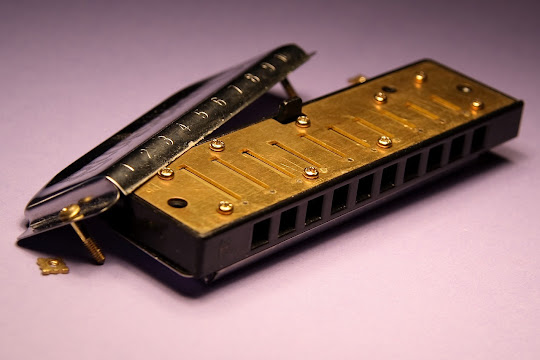Which harmonica is better for beginners?
As someone who's been playing the harmonica for years, I understand how crucial it is to choose the right harmonica, especially for beginners. The harmonica is a versatile and compact instrument, making it an excellent choice for new musicians. However, picking the right one can make all the difference in your learning experience and enjoyment.
Understanding Different Types of Harmonicas
Diatonic Harmonica
The diatonic harmonica is the most common type and is often recommended for beginners. It's designed to play in a specific key, making it easier to learn basic songs and techniques. Diatonic harmonicas are widely used in blues, folk, and rock music.
Chromatic Harmonica
Chromatic harmonicas have a button-activated slide that allows you to play all notes, including sharps and flats. This type of harmonica is versatile and can be used for a variety of music genres, including jazz and classical. However, it can be more challenging for beginners due to its complexity.
Tremolo and Octave Harmonicas
Tremolo and octave harmonicas have double reeds for each note, producing a unique, wavering sound. They are popular in traditional and folk music. While they offer interesting sounds, they may not be the best starting point for beginners due to their less common use and specific sound.
Key Features to Consider for Beginners
Ease of Play
For beginners, it's essential to choose a harmonica that is easy to play. Look for models with smooth edges and comfortable mouthpieces. Diatonic harmonicas, especially in the key of C, are often the easiest to start with.
Durability
Durability is another important factor. Beginners may drop or mishandle their harmonica, so choosing one that can withstand some wear and tear is wise. Harmonicas with metal combs and sturdy covers are typically more durable.
Cost
While it's tempting to go for the cheapest option, investing in a quality harmonica can greatly enhance your learning experience. Affordable yet reputable brands offer beginner models that balance cost and quality effectively.
Availability of Learning Resources
Having access to learning resources can significantly aid your progress. Look for harmonica models that come with instructional materials or are widely covered in online tutorials and books.
Recommended Harmonicas for Beginners
Hohner Special 20
Features: The Hohner Special 20 is a diatonic harmonica known for its ease of play and durability. It has a plastic comb and recessed reed plates. Pros: Comfortable to play, airtight, durable Cons: Slightly higher price Customer Reviews: Many beginners praise its smooth playability and consistent quality.
Lee Oskar Major Diatonic
Features: The Lee Oskar Major Diatonic is another excellent choice. It's known for its bright sound and interchangeable reed plates. Pros: Easy to maintain, clear sound, durable Cons: Somewhat expensive Customer Reviews: Users appreciate its reliability and easy maintenance.
Suzuki Harmonica HA-20-C
Features: The Suzuki HA-20-C is a diatonic harmonica with a solid build and excellent tone. Pros: High-quality materials, responsive reeds Cons: Higher price point Customer Reviews: Many players commend its tonal quality and longevity.
Seydel Blues Session Steel
Features: This harmonica features stainless steel reeds and a plastic comb, offering great durability and a clear tone.Pros: Long-lasting reeds, smooth playability Cons: Slightly more expensive Customer Reviews: Beginners like its robust build and the ease with which they can produce sound.
Easttop Blues Harmonica
Features: The Easttop Blues Harmonica is a budget-friendly option that doesn’t compromise on quality. Pros:Affordable, good sound quality Cons: Less durable than higher-end models Customer Reviews: Beginners find it a great entry-level harmonica with decent sound and build quality.
Tips for Choosing the Right Harmonica
Considering Your Musical Goals
Think about the music genres you want to play. Diatonic harmonicas are great for blues, rock, and folk, while chromatic harmonicas are better for jazz and classical.
Trying Before Buying
If possible, try out different harmonicas to see which one feels comfortable and suits your playing style.
Seeking Advice from Experienced Players
Consult with experienced harmonica players or teachers. Their insights can be invaluable in helping you make the right choice.
Maintenance and Care Tips
Cleaning Your Harmonica
Regularly clean your harmonica to maintain its sound quality and longevity. Use warm water and a mild soap for diatonic harmonicas with plastic combs.
Proper Storage
Store your harmonica in a case to protect it from dust and physical damage. Avoid extreme temperatures and humidity.
Regular Maintenance Routines
Inspect your harmonica regularly for signs of wear and tear. Replace reeds and other components as needed to keep it in good playing condition.
Expert Opinions and Testimonials
Quotes from Renowned Harmonica Players
Renowned harmonica players often emphasize the importance of starting with a quality instrument. For instance, Toots Thielemans once said, "A good harmonica is like a good friend; it’s there when you need it."
Beginner Experiences and Reviews
Many beginners share positive experiences with starting on well-made diatonic harmonicas. They often highlight how a good instrument made learning more enjoyable and motivating.
Conclusion
Choosing the right harmonica is crucial for beginners. It can make the learning process smoother and more enjoyable. Consider factors like ease of play, durability, cost, and available learning resources when making your decision. With the right harmonica, you'll be well on your way to mastering this versatile instrument.
FAQs
What type of harmonica is easiest for beginners to learn?
- Diatonic harmonicas, especially in the key of C, are typically the easiest for beginners.
How much should I spend on my first harmonica?
- Investing around $30-$60 in a quality beginner harmonica is recommended.
Can I learn harmonica without any musical background?
- Yes, many resources and tutorials are available for complete beginners.
What key harmonica should a beginner start with?
- The key of C is often recommended for beginners due to its widespread use in tutorials and beginner music.



Comments
Post a Comment